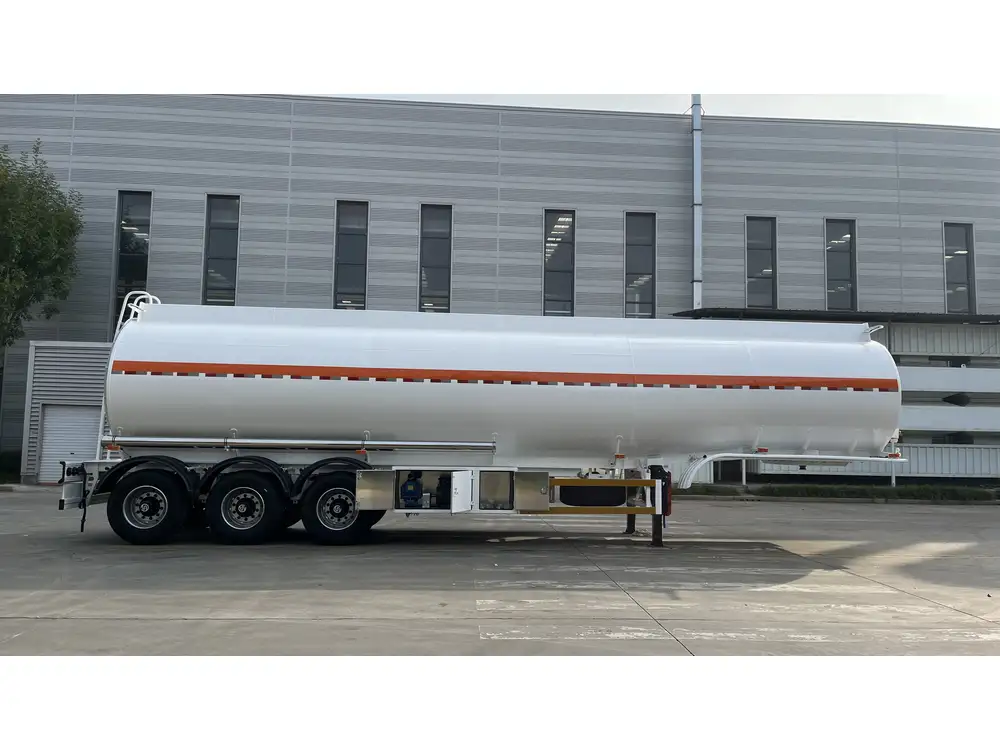In the world of logistics and transport, particularly concerning tank trailers, precision in terminology is vital for ensuring safety and compliance. The term “inedible” surfaces frequently, yet its implications are often misunderstood or overlooked. This article delves deeply into what “inedible” signifies within the context of tank trailers, unpacking its impact on manufacturers, operators, and safety regulations.
What Does “Inedible” Mean?
Inedible refers to substances that cannot or should not be consumed by living beings. In the context of tank trailers, this typically pertains to materials transported that are hazardous or unsuitable for human consumption. For instance, chemicals, hazardous waste, or certain industrial products might be labeled as inedible. Understanding this designation is critical for users in various industries.
Key Contexts of “Inedible” in Tank Trailers
Agricultural Transport: Tank trailers are often used in agriculture to transport fertilizers, pesticides, and other chemicals. These materials are essential for farming but classified as inedible due to their toxicity.
Chemical Transport: Substances like industrial lubricants or solvents are transported in tank trailers. The label ‘inedible’ clearly differentiates these chemicals from consumable goods.
Waste Management: Waste tank trailers move hazardous or inedible materials from production to treatment facilities. Mislabeling these materials could lead to serious health and environmental risks.

Importance of Understanding “Inedible” Labels
Safety Compliance
Understanding the “inedible” label is crucial for safety compliance across industries. The correct handling of such materials avoids cross-contamination and ensures that operatives are aware of the risks involved. In the mishandling of inedible substances, companies face legal repercussions, fines, and severe damage to reputation.
Risk Management
Being informed about the inedibility of specific materials allows for better risk assessment and management. Companies working with tank trailers can develop training programs for employees, ensuring they are well-versed in the handling of inedible materials.
| Aspect | Importance |
|---|---|
| User Safety | Protects against exposure to hazardous materials. |
| Regulatory Compliance | Ensures alignment with local and international transporting regulations. |
| Environmental Protection | Reduces the risk of harmful spills or contamination. |

Regulations Governing Inedible Substances
The transportation of inedible materials within tank trailers is governed by stringent regulations, which vary by region. For example, the U.S. Environmental Protection Agency (EPA) enforces rules concerning hazardous material transportation, impacting the manufacturing and operational procedures surrounding tank trailers.
Key Regulatory Bodies
United States Environmental Protection Agency (EPA): Responsible for enforcing laws related to hazardous waste management, including regulations on inedible substances.
Department of Transportation (DOT): Regulates the transportation of dangerous goods. Understanding their guidelines ensures compliance and safety.
Occupational Safety and Health Administration (OSHA): Focuses on workplace safety concerning hazardous materials.
Consequences of Non-Compliance
Failing to adhere to the regulations surrounding inedible substances can result in severe consequences for companies and individuals involved. These may include:
Fines and Penalties: Non-compliance can trigger significant monetary fines from regulatory bodies.
Reputational Damage: In the age of information, public perception can devastate companies that fail in safety compliance.
Legal Ramifications: Negligence in transporting inedible substances can lead to lawsuits and liability claims.
Operational Disruptions: Non-compliance may result in the halting of operations during investigations or after spills, damaging business continuity.

Identifying Inedible Substances for Tank Trailers
It is essential to differentiate between edible and inedible substances transported in tank trailers. Below are some commonly transported inedible materials:
Common Inedible Substances
Petrochemicals: Fuels and other derived substances from crude oil that pose risks if ingested.
Industrial Chemicals: Numerous chemicals utilized in manufacturing processes that are not meant for consumption.
Pesticides and Herbicides: Although critical for agricultural practices, these substances are strictly inedible.
Waste Products: Includes non-recyclable materials or materials requiring hazardous waste disposal.
Handling Inedible Materials

Best Practices
To ensure the safe transportation of inedible materials, companies engaging with tank trailers should adhere to best practices, ensuring both employee and public safety:
Proper Training: Regular training sessions must be conducted for employees in the handling of inedible substances.
Labeling: Every tank trailer should clearly display labels that denote the materials as inedible to avoid any confusion.
Emergency Protocols: Established protocols for spills or leaks should be in place, including the necessary personnel and equipment.
Regular Inspections: Conduct routine inspections on tank trailers to avoid wear and tear that could lead to spills.
Training for Handling Inedible Substances
To safeguard against the dangers associated with inedible substances, a comprehensive training program should include:
Material Safety Data Sheets (MSDS): Understanding and applying guidelines found on MSDS forms, which instruct on safe handling and emergency protocols.
Emergency Response: Familiarizing employees with steps to take in case of a spill ensures faster reaction times and mitigates risks.
Proper Equipment Usage: Employees must be trained on how to use protective gear effectively.
Conclusion
The term “inedible” in the context of tank trailers carries significant weight, denoting substances that must be handled with utmost care and adherence to safety regulations. As manufacturers transporting such materials, understanding the implications of inedibility is essential to ensure compliance, safety, and efficient operations. Knowledge of associated risks and regulation not only enhances the operational integrity of your business but also secures a reputation for responsibility in an industry where safety cannot be compromised.
By embracing the complexities associated with inedible materials and proactively addressing them, we not only comply with laws but also pave the way for responsible business practices that prioritize safety and environmental stewardship. Emphasizing best practices through thorough training, effective communication, and strict adherence to regulations ensures that the transportation of inedible substances is conducted smoothly, safely, and responsibly.
This dedication will foster trust amongst stakeholders, safeguard the well-being of employees, and maintain the viability of business operations in a competitive landscape.



